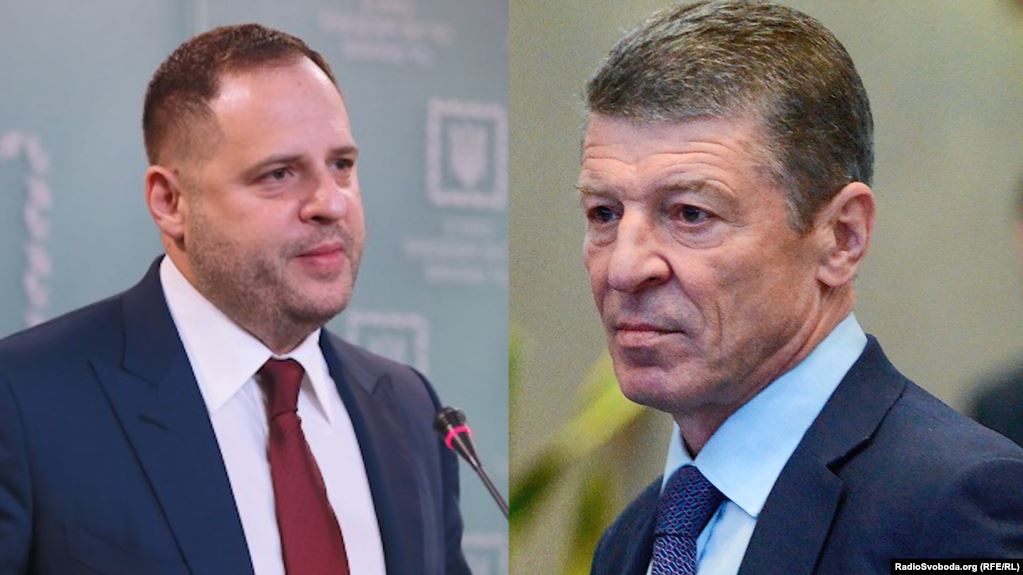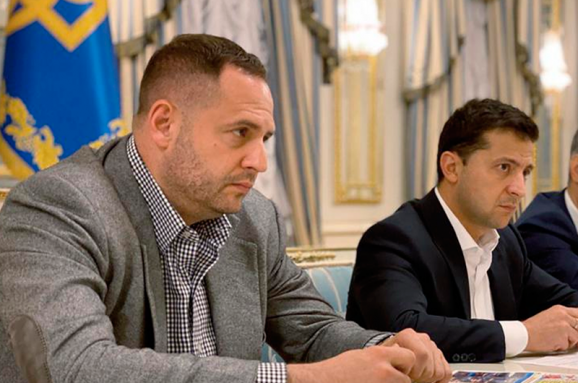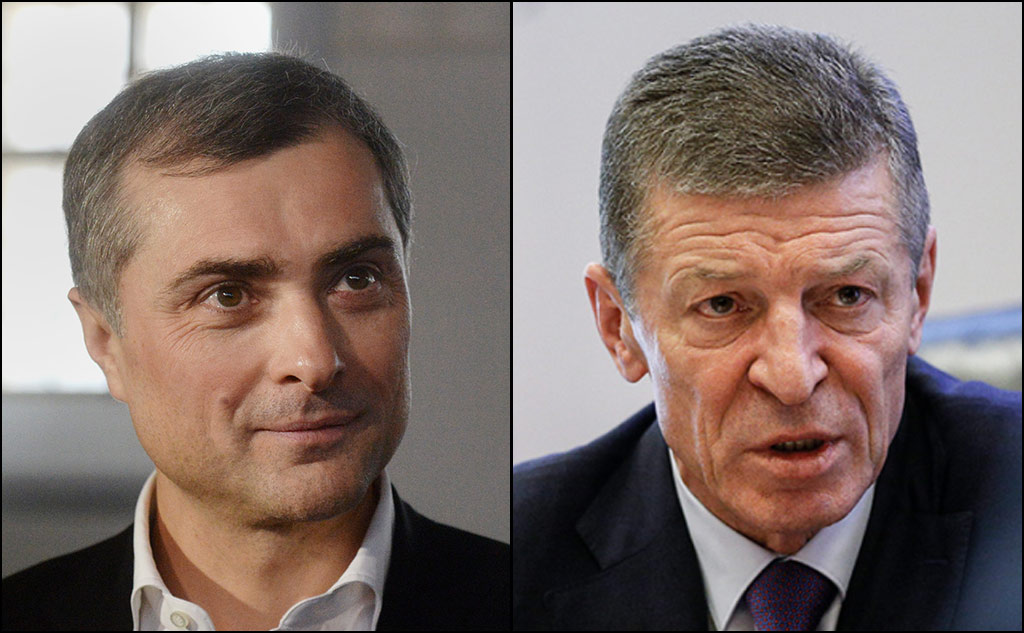It’s March 2020, and updates about the coronavirus fill the newscasts and grab all the attention. Meanwhile, Viktor Medvedchuk, the Kremlin’s main voice in Ukraine, together with other Ukrainian MPs from the pro-Russian “Opposition Platform - For Life” visit Moscow to hold meetings with Vladimir Putin and representatives of the Russian Parliament at a Duma session - for the first time since 2014.
The main topic for discussions at the meeting on 11 March was creating a working group out of parliamentarians of the Normandy Four member countries for “implementing the Minsk agreements.” The Ukrainian Parliament reacted by stating that the group of MPs represented only their own political faction and not the Ukrainian Parliament.
On the same day, an extraordinary meeting of the Trilateral Contact Group on the peaceful settling of the Donbas situation took place in Minsk. Although President Zelenskyy’s Office informed that the get-together between Andriy Yermak, the head of Volodymyr Zelenskyy’s President’s Office, and Dmitry Kozak, deputy head of Putin’s Presidential Administration, resulted in an agreement on additional troop withdrawals, exchange of prisoners, and checkpoint openings, and an enigmatic Consultation Council, the truth may be more sinister, according to the Ukrainian outlet DT.ua.
The media published photos of agreements which were likely signed during the Trilateral Contact Group in Minsk. The text of the agreements goes in line with the Russian scenarios for Ukraine, and, correspondingly, pro-Russian forces within Ukraine. Taking the agreements into consideration, fewer doubts are left that Ukraine’s government has fallen for Russia’s demands.
Read also:
- Russia’s policies toward Ukraine remain unchanged month after Kremlin’s “gray cardinal” replaced
- Fears of a pro-Russian turn as Yermak appointed as new head of Ukrainian President’s Office
The most contentious part of the agreements is the Consultation Council. The latter is to be part of the political subgroup of the Trilateral Contact Group and was said to have been created after consultations with representatives of the OSCE, France, and Germany in connection to agreements reached during the last Normandy Summit in December 2019.
On 13 March, Dzerkalo Tyzhnia published photos of the agreements reached at the Minsk meeting. The media states it received the documents from a source in the negotiation group.


The document confirms that a Consultation Council has indeed been created, and it treats the parts of Donbas occupied by Russia - the Luhansk and Donetsk “people’s republics” - as having political subjectivity and grants Russia the status of a “guarantor-observer” equal to Germany, France, and OSCE.
Thus, this council would drive Ukraine to have direct negotiations with Russia’s puppet entities - reinforcing the Kremlin’s narrative of the war in Donbas being a Ukrainian “internal matter,” i.e. it is a conflict with genuine separatist political actors rather than Russian creations.
The protocols state that the decision on the creation of the Consultation Council is to be signed on 25 March 2020 after consultations with representatives of the OSCE, France, and Germany.
"The main task of the Council is to carry out dialogue, consultations, and developing proposals on draft political and legal solutions for the conflict settlement in accordance with the complex of measures, including the holding elections in certain parts of Donetsk and Luhansk oblasts of Ukraine," the document says.
The agreements also define that the criteria and the order of appointing members to the Council are defined by Ukraine, certain parts of Donetsk and Luhansk Oblasts of Ukraine [ORDLO], Russia, Germany, France, and OSCE independently. The Council will consist of 10 representatives from Ukraine and the ORDLO, and one from the OSCE, Russia, Germany, and France, each with the right of the advisory vote. The decisions of the Council will have an advisory nature.
The document released by dt.ua is signed by Heidi Grau, the OSCE Ambassador, Ukraine’s ex-president Leonid Kuchma, Russia’s special representative Azamat Kulmukhametov, and two representatives of the the-called “Donetsk and Luhansk people’s republics.”
RFE/RL confirmed that the above-mentioned agreements indeed took place, referring to its own source in the Trilateral Group. According to the source, the suggestions on the creation of the Consultation Council and the new format of the disengagement of forces came from Dmitry Kozak, who replaced Vladislav Surkov as the curator for the Donbas “republics” this February.
- Read also: Russia’s policies toward Ukraine remain unchanged month after Kremlin’s “gray cardinal” replaced
Calls to prosecute Ukrainian TCG representatives for “state treason”
The agreements were decried as surrendering Ukrainian national interests by a vocal part of Ukrainian society.
Oleksandr Ivanov, one of the coordinators of the Capitulation Resistance Movement, a civic movement with the stated goal of resisting Ukraine’s perceived capitulation to Russia, commented that the only chance for Zelenskyy to evade responsibility for “state treason” is to revoke Ukraine’s signature in the document, dismiss Yermak from the position of head of the President’s Office, withdraw him and Kuchma from the Contact Group, and launch criminal proceedings against both for state treason.
“However, I feel that he will not do it. From this very moment, I view this government as Russia’s collaborators.”
Yuriy Butusov, Editor in Chief of censor.net, explains that the document demonstrates that despite calling ORDLO representatives “unrecognized authorities,” Ukraine’s government in fact recognizes them as legitimate officials of the occupied territory, and in this removes Russia’s responsibility for the peaceful regulation of the conflict.
“Secretly, without agreeing with the Ukrainian Parliament, Ukrainian representatives accepted Putin’s scenario - basically, recognizing Russia’s occupation authorities as ‘representatives of certain parts of Ukraine.’”
Butusov also notes that the recognition of the “certain parts” totally violates the position that President Zelenskyy voiced at the Munich Conference this February when he stressed Ukraine is ready for “dialogue” with civilians of ORDLO, and “not with those who are not recognized in terms of international law and therefore cannot represent the local population of Ukraine.”
Also, the journalist notes that the new scenario is identical to the one which was implemented in Transnistria when Moldova gave up a part of its territories. Butusov adds that that time the document was signed by Kozak as well.
“The Security Service investigator who opens a criminal case under article 111 ‘State treason’ against Ukraine’s representatives in the Trilateral Contact Group will become part of the history of the War for independence. I hope that such brave people exist in the Security Service,” Butusov added and called for Zelenskyy to “tear apart” the document signed by Kuchma, as the “last chance” to save his political career.
On 13 March, Yermak commented on the reached agreements. He explained who should be included in the Consultation Council from the Ukrainian side. However, he did not explain with whom they will be negotiating.
“I want to stress that there exist no steps for creating a legal framework for recognizing the so-called ORDLO representatives. There is no talk about direct negotiations. We are talking about a platform where citizens of Ukraine who today live on the controlled, as well as on the uncontrolled territory can communicate regarding the questions agreed in the package of Minsk Agreements. What is recognition? Recognition is a legal fact, legal action. As you know, even Russia today did not recognize the so-called ORDLO.”
Meanwhile, RFE/RL stresses that Russian media and ORDLO TV channels presented the agreements of the Trilateral Contact Group as a breakthrough. Kozak, in his turn, stated that a new mechanism, “a dialogue platform with the participation of the Normandy Format countries, and conflicting sides” for settling the Donbas situation was created.
Dzerkalo Tyzhnia observer Tetyana Sylyna summarizes that Moscow is pushing the implementation of political aspects of Minsk while violating all the security aspects of the deal. In this format, the aggressor country will receive a confirmation of its narrative that Russia is not present in Donbas, and will sit at a table as a mediator, not a side of the conflict.
Initiative criticized by Zelenskyy’s political force
The initiative of the Consultation Council was criticized even by Zelenskyy’s own political force, the Servant of the People party, which was thought of as being loyal to the president.
“The practical realization of the [...] Сouncil sets the stage for questioning the position of our state, enshrined in the Ukrainian legislation, that there is armed aggression in eastern Ukraine by the Russian Federation, which has temporarily occupied the Autonomous Republic of Crimea, the city of Sevastopol and the territories in Donetsk and Luhansk oblasts.
This approach can undermine the continuation of sanctions by our western partners. Apart from this, in no way does it settle the security component of the conflict in Donbas. [...] We appeal to the president of Ukraine about the necessity [...] for the Ukrainian representatives to the Trilateral Contact Group to return to the frames of Ukrainian legislation and prevent the realization of the publicized decisions on the Consultation Group in the ways and forms which are not supported by the people of Ukraine, contradict Ukrainian law and national interests,” says a statement by Servant of the People MP Anastasiia Krasnosilska written in the name of a number of SoP MPs.
(UPDATE: the list of signatories is being formed in this document).
Calls to unite in face of “mortal danger”
Meanwhile, an open statement shared by Hanna Hopko, ex-MP and ex-head of the Committee of Foreign Affairs in the Ukrainian Parliament, says that the implementation of the agreement reached in Minsk would lead to the political and legal recognition of Russian aggression and occupation of Donbas as a presumed “internal conflict” in eastern Ukraine, which will lead to the collapse of sanctions enacted by other countries against Russia.
As well, the statement says, it would lead to shifting the burden of responsibility for human and material losses during Russian aggression in the East onto Ukraine’s shoulders, to Ukraine losing its right to justice, as it would allow war criminals to evade responsibility for crimes “against the Ukrainian people and universal principles of humanity,” and undermining the positions of Ukraine in the international courts in cases related to Russian aggression.
“This recognition basically means Ukraine is rejecting an effective strategy for the de-occupation of Crimea, and that Ukraine’s prospects for European and Euro-Atlantic integration are being curtailed, contrary to the vital interests of the Ukrainian people. In turn, the curtailment of sanctions and the weakening of legal pressure on the Russian Federation will inevitably lead to facilitating Russia’s subversive activity in Ukraine, the escalation of Russian aggression, and the seizure of new territories by Ukraine,”
the statement says, calling upon all political and social circles “that care” to unite “in the face of the mortal danger” Ukraine finds itself in, and “not allow the state of Ukraine to enter the path of self-annihilation.”
Read also:
- What if? Hybrid War and consequences for Europe (part 1)
- Portnikov: Putin’s coalition now rules Ukraine
- The real problem with “Steinmeier’s formula” and the Russo-Ukrainian war
- Can Zelenskyy “stop the war in Donbas” and how will the Steinmeier formula affect Ukraine? An FAQ
- Protests against Steinmeier’s formula spread in Ukraine, “movement against capitulation” founded





